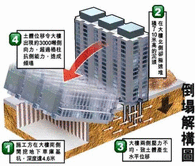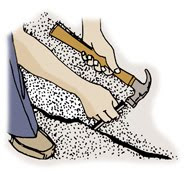FIELD DENSITY TEST OR SAND REPLACEMENT METHODE
gd = gt / (1+ w)
gd = Dry unit weight ( KN/ m3 )
gt = Total unit weight
w = Water content (%)
gd = Dry unit weight ( KN/ m3 )
gt = Total unit weight
w = Water content (%)
Test Equipments
- Sand cone apparatus which consists of a one-gallon plastic bottle with a metal cone attached to it.
- One-Gallon plastic can with cap.
- Balance sensitive to 1 g.
- Base plate
- Tools for excavating a hole in the ground
- Clean, uniformly graded sand ranging from #20 to #30 sieve such as Ottawa Sand
- Proctor compaction mold without attached extension (used for calibration)
- Plastic air-tight bag for carrying wet excavated soil from field to the lab.
- Metal tray with a hole in the centre.
- Oven with temperature kept about 105-110 .c.
Sand Cone Test Procedure :
Step 1- . Weight of Proctor mold, W1
Step 2a- Pouring the sand into the compaction mold
Step2b- Making the surface leveled
Step2c- Compaction mold filled out with sand
Step2c- Compaction mold filled out with sand
Step 2d-Weight of proctor mold + Sand, W2
Step 5. Weight of plastic Gallon+Cone+Sand (before use)
Step 6a-Close the valve of the cone attached to the cone
Step 6b- turn the cone and gallon upside down
Step 6c- open the valve, sand flows from the gallon to the cone, after the flow stops close the valve and take the gallon+cone from the tray
Step 6d- CNTD...
Step 6e- Weight of plastic Gallon+Cone+Sand (after use)
Step 8a- Weight of plastic Gallon+Cone+Sand (before use)
.jpg)
Step 8b- Go to the field where the soil's unit weight is to be measured and place the metal tray and fasten the 4 screws.
Step 8c- Dig up a hole about 10 to 15 cm deep.
Step 8d- As you are digging the hole put the retrieved soil into the plastic bag in order that the soil does not lose moisture.
Step 8e- All of the soil is transferred into the bag
Step 8f- The soft soil at the bottom of the hole is poured into the bag as well.
Step 8g- All of the soil is transferred into the bag
step 8h-Having the valve closed turn the gallon+cone upside down and place the cone in the center hole of tray and open the valve so that sand flows
Step 8i- sand flows CNTD... Unlike this photo plastic bag should be kept closed
Step 8j- After flow of sand stops close the valve and pick the assembly up, the sand in the cone will be poured into the tray.
Step 8k- CNTD
Step 8L- The sand in the hole and the overflow sand will be left in the field, grab all parts and get back to the lab.
Step 9- Weight of plastic Gallon+Cone+Sand (after use)
Step 11- Weigh the evaporating dish
step 12- Weigh the evaporating dish + wet soil from the field
Step 13- Put the evaporating dish + wet soil in the oven and after 24hrs weigh it again
Test Steps
Obtaining the unit weight of the sand used
1. Weight of Proctor mold, W1 = 4.178 kg
2. Weight of proctor mold + Sand, W2 = 5.609 kg
3. Volume of the mold, V1 = 0.00095 m3
4. Dry unit weight, gd (sand) = (W2 - W1) / V1 = 1506 kg/m3
Calibration cone
5. Weight of plastic Gallon+Cone+Sand (before use), W3 = 5.466 kg
6. Weight of plastic Gallon+Cone+Sand (after use), W4 = 3.755 kg
7. Weight of the sand to fill the cone, Wc = W4- W3 = 1.711 kg
Results from field tests
8. Weight of plastic Gallon+Cone+Sand (before use), W5 = 7.387 kg
9. Weight of plastic Gallon+Cone+Sand (after use), W6 = 3.919 kg
10. Volume of hole, V2 = (W5-W6-Wc)/ gd (sand) = 0.00117m3
11.Weight of evaporating dish, W7 = 0.507 kg
12. Weight of evaporating dish + wet soil from the field, W8 = 2.334 kg
13. Weight of evaporating dish + dry soil after 24hrs, W9 = 2.251 kg
14. Moist unit weight of the soil in the field, gt (in-situ soil) = (W8 - W7) / V2 = 1561 kg/m3
15. Water content in the field, w(%)= (W8 - W9) / (W9- W7)*100 = 4.76%
16. Dry unit weight in the field, gd (in-situ soil)= [gt (Row 14)] / [1+ w(%) / 100] = 1490 kg/m3
Test Steps
Obtaining the unit weight of the sand used
1. Weight of Proctor mold, W1 = 4.178 kg
2. Weight of proctor mold + Sand, W2 = 5.609 kg
3. Volume of the mold, V1 = 0.00095 m3
4. Dry unit weight, gd (sand) = (W2 - W1) / V1 = 1506 kg/m3
Calibration cone
5. Weight of plastic Gallon+Cone+Sand (before use), W3 = 5.466 kg
6. Weight of plastic Gallon+Cone+Sand (after use), W4 = 3.755 kg
7. Weight of the sand to fill the cone, Wc = W4- W3 = 1.711 kg
Results from field tests
8. Weight of plastic Gallon+Cone+Sand (before use), W5 = 7.387 kg
9. Weight of plastic Gallon+Cone+Sand (after use), W6 = 3.919 kg
10. Volume of hole, V2 = (W5-W6-Wc)/ gd (sand) = 0.00117m3
11.Weight of evaporating dish, W7 = 0.507 kg
12. Weight of evaporating dish + wet soil from the field, W8 = 2.334 kg
13. Weight of evaporating dish + dry soil after 24hrs, W9 = 2.251 kg
14. Moist unit weight of the soil in the field, gt (in-situ soil) = (W8 - W7) / V2 = 1561 kg/m3
15. Water content in the field, w(%)= (W8 - W9) / (W9- W7)*100 = 4.76%
16. Dry unit weight in the field, gd (in-situ soil)= [gt (Row 14)] / [1+ w(%) / 100] = 1490 kg/m3
Conversion factors (Unit weight):
1000 kg/m3 = 9.81 KN/m3 = 62.4 lb/ft3
.jpg)
.jpg)
.jpg)
.jpg)
.jpg)
.jpg)
.jpg)
.jpg)
.jpg)
.jpg)
.jpg)
.jpg)
.jpg)
.jpg)
.jpg)
.jpg)
.jpg)
.jpg)
.jpg)
.jpg)
.jpg)
.jpg)
.jpg)
.jpg)
.jpg)
.jpg)
.jpg)















 Dollar Amerika tukar, currency converter
Dollar Amerika tukar, currency converter
No comments:
Post a Comment